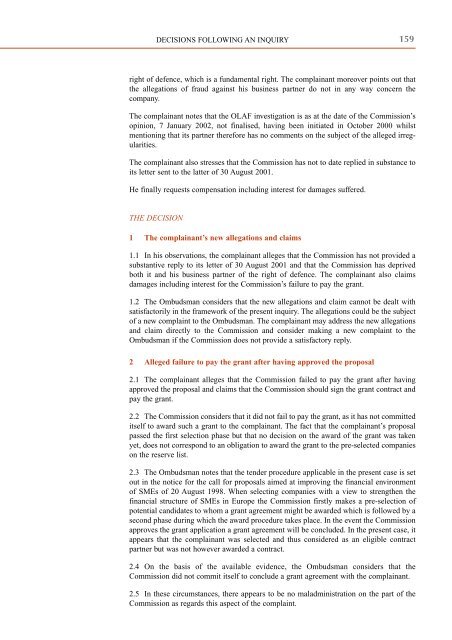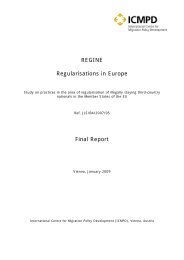Annual report 2002 - EOI
Annual report 2002 - EOI
Annual report 2002 - EOI
You also want an ePaper? Increase the reach of your titles
YUMPU automatically turns print PDFs into web optimized ePapers that Google loves.
DECISIONS FOLLOWING AN INQUIRY 159<br />
right of defence, which is a fundamental right. The complainant moreover points out that<br />
the allegations of fraud against his business partner do not in any way concern the<br />
company.<br />
The complainant notes that the OLAF investigation is as at the date of the Commission’s<br />
opinion, 7 January <strong>2002</strong>, not finalised, having been initiated in October 2000 whilst<br />
mentioning that its partner therefore has no comments on the subject of the alleged irregularities.<br />
The complainant also stresses that the Commission has not to date replied in substance to<br />
its letter sent to the latter of 30 August 2001.<br />
He finally requests compensation including interest for damages suffered.<br />
THE DECISION<br />
1 The complainant’s new allegations and claims<br />
1.1 In his observations, the complainant alleges that the Commission has not provided a<br />
substantive reply to its letter of 30 August 2001 and that the Commission has deprived<br />
both it and his business partner of the right of defence. The complainant also claims<br />
damages including interest for the Commission’s failure to pay the grant.<br />
1.2 The Ombudsman considers that the new allegations and claim cannot be dealt with<br />
satisfactorily in the framework of the present inquiry. The allegations could be the subject<br />
of a new complaint to the Ombudsman. The complainant may address the new allegations<br />
and claim directly to the Commission and consider making a new complaint to the<br />
Ombudsman if the Commission does not provide a satisfactory reply.<br />
2 Alleged failure to pay the grant after having approved the proposal<br />
2.1 The complainant alleges that the Commission failed to pay the grant after having<br />
approved the proposal and claims that the Commission should sign the grant contract and<br />
pay the grant.<br />
2.2 The Commission considers that it did not fail to pay the grant, as it has not committed<br />
itself to award such a grant to the complainant. The fact that the complainant’s proposal<br />
passed the first selection phase but that no decision on the award of the grant was taken<br />
yet, does not correspond to an obligation to award the grant to the pre-selected companies<br />
on the reserve list.<br />
2.3 The Ombudsman notes that the tender procedure applicable in the present case is set<br />
out in the notice for the call for proposals aimed at improving the financial environment<br />
of SMEs of 20 August 1998. When selecting companies with a view to strengthen the<br />
financial structure of SMEs in Europe the Commission firstly makes a pre-selection of<br />
potential candidates to whom a grant agreement might be awarded which is followed by a<br />
second phase during which the award procedure takes place. In the event the Commission<br />
approves the grant application a grant agreement will be concluded. In the present case, it<br />
appears that the complainant was selected and thus considered as an eligible contract<br />
partner but was not however awarded a contract.<br />
2.4 On the basis of the available evidence, the Ombudsman considers that the<br />
Commission did not commit itself to conclude a grant agreement with the complainant.<br />
2.5 In these circumstances, there appears to be no maladministration on the part of the<br />
Commission as regards this aspect of the complaint.
















